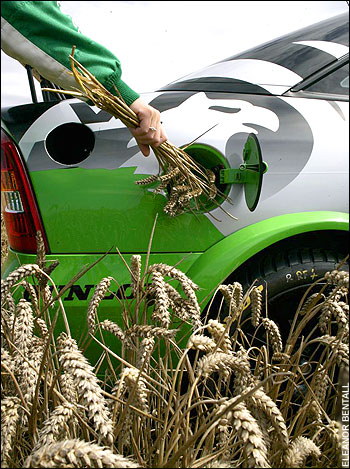
According to a report in The Telegraph, the rush for biofuels is causing a lot of damage to the environment. A campaign group has been quoted saying that whole ecosystems are being destroyed and hundreds of thousands of people being displaced to make way for crops required for biofuels.
The campaign group has claimed that some biofuels are no better than the traditional fossil-fuels. They do not help in cutting emissions – lot of fuel is used up in manufacturing of the biofuel.
The report says that even the term biofuel is a misnomer and should instead be called agrofuel.
The report claims that in Latin America, Asia and Africa, the push for agrofuels is leading to the reintroduction of the old colonial plantation system at the expense of indigenous farming systems and local communities. [Remember indigo plantation in our country India. The local farmers were forced to cultivate indigo that was more useful to the ruling community and was not needed by the farmers. It was an unjust practice with which Mahatma Gandhi started his struggle in India.]
The report adds:
The EU has said it wants to see at least 10 per cent of road fuel derived from plants by 2020 and President Bush recently announced a 15 per cent target for the replacement of petrol by biofuels in US vehicles. In the next 18 months, biofuel production in the US will double to about seven per cent of the petrol consumed.
The increasing acceptance of biofuels as an environment friendly alternative to fossil fuels, I believe, is not good. There are certain alternatives which can help countries tackle the growing demand of energy. In India, the fuel obtained from jatropha seeds is being promoted and efforts are on to convert the oil extracted from jatropha seeds into efficient fuel for vehicles.
The government is promoting plantation of jatropha on arid and practically barren land. This is looked at as an opportunity to help people living in less fertile areas generate income along with boosting the fuel supply.
This is believed to help save lot of foreign reserves which is till now being spent on fuel imports. As far as jatropha is concerned, it is a good way of making use of land which was so far least productive.
Even as I say that the land is least productive, this does not mean that the land should be planted without any consideration. These lands are as much part of the ecosystem and have their own importance. Proper studies should be done before human intervention into these areas. There are several instances of damage caused to the ecosystem by human interference in way of introduction of new species, both deliberate and accidental. Introduction of foreign species have caused serious ecological threats.
Use of sugarcane, maize and other crops for production of biofuels pose another challenge. A lot of crop that could have fed humans ends up in fuel tanks of vehicles instead of hungry people. The increasing demand of maize for ethanol production for use as fuel along with petrol and diesel has caused the maize prices to go up. This affects the poor the most who live on the crops which are now increasingly being used for production of biofuels.
The alternatives to traditional fuels must be searched, both to meet the increasing energy demands as well as saving our climate and environment, but judiciously. It should never happen that with the intent of saving the earth, we further worsen the situation.
Image Source: Telegraph
Source: Telegraph




